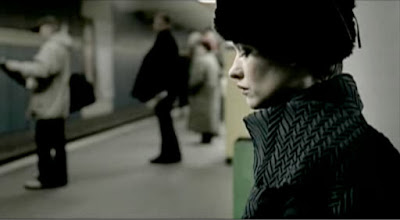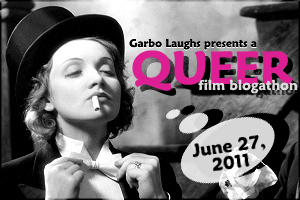Stop me if you've heard this one: an accomplished assassin is fed up with her job and wants to get out of the business. Her employer is amenable, but demands that she do one last job. Yeah. It's a familiar plot, one that gets an austere re-thinking in the German film, Don't Look for Me (2004, directed by Tilman Zens). The assassin in question is Anna (Lea Mornar), who is burned out on her job, but performs it in anonymous hotels and restaurants. During her final mission, her target spots her. She plays along with him as he flirts with her, and tries to abort the mission, but her superiors won't relent. Her target ends up turning the tables on her, and though she escapes, she's now on the run from her employer/lover, who wants her to finish the job.

What distinguishes this from, say, La Femme Nikita or The Killer, both of which have more or less the same plot, is the cinematic approach. This is a quotidian movie, filmed in that deadpan that German filmmakers seem to live in. Mornar's assassin is not an action fetish figure. She's a woman whose job is eating her alive. She not a lot different from anyone who has a job in which they feel trapped, in a job that they hate. Hers is just a bit more soul-crushing. The locations are unglamorous, too. At some point she laments that one day she'll die in a hotel room. She's rootless, and you can see it in her eyes. There's some violence in the movie, but the violence is abrupt and ugly and I can't imagine an audience for action films getting off on it.

In sum, this is a desaturated, ugly film, but there's a point to this. Anna's final job, the price of her freedom, is one that would sever her from humanity. The dehumanizing price of violence in this movie is all-consuming, and she knows it. It's a tonic for the usual romance involved in this plotline, a nice ward against the bullshit of the archetype. Of course, it's not much fun, but it wants to confront the "fun" quotient of the noble assassin head on. That's not to say that there aren't pleasures to be had, just that if you're looking for the thrills of a thriller, you should probably look elsewhere. All there is here is an existential void.

For her part, Lea Mornar delivers a fine melancholy portrait of a burned out killer. The movie begins with a sexualized version of her. The opening of the film depicts her getting tarted up for a job, and it's all about surfaces. Slowly, surely, the movie drains that away. It strips the surface down to the raw bones of her face and the sadness in her eyes. In part, it does this with the nature of her missions. In part it does this by showing the minutia of her trade. The combination is a portrait in anomie. This is matched by the gray drabness of its style. Director Tilman Zens isn't such a minimalist that he doesn't move the camera, but his shot compositions are exercises in minimalism. This is not an expressionist movie. It's interiors are washed out by fluorescent light. Its exteriors are overcast, set among faceless apartment blocks and standardized hotels. It's a murky visual style that matches the moral universe of the subject matter. Again, this isn't much "fun," but it is effective.

I should note that "Fun" and "Interesting" aren't the same thing, and this film understands that there is nothing more interesting than the human heart in conflict with itself. I generally like these kinds of movies, because I think people are as interesting as plots and stories. Just saying.

Where the film loses its way is in its utter banality. Formal considerations aside, this is a familiar story, and at the basic level of story, it's NOT a lot different from other films of its ilk, however much the form may differ. I understand the possibilities offered by a simplified framework, but the filmmakers here have pared it down too far into a cliché. Mind you, Don't Look for Me is short at 83 minutes long, but this is a case where some level of complication might have helped transform a routine genre exercise into a scathing deconstruction. As it is, it hews too closely to its formula and unavoidably reminds the viewer of other film. This is probably a conscious decision on the part of the filmmakers, but not all ideas are necessarily good when you realize them on screen. It's not a bad film; it's just one that's kind of a slog for a payoff that anyone can see coming a mile away, and one that has ambitions that are just out of its reach.
















No comments:
Post a Comment